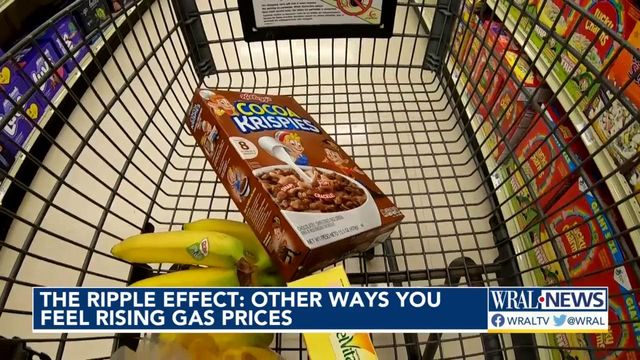As gas prices increase, Duke professor warns of potential recession
Americans could begin to feel the effects of increased gas prices by paying more at the grocery store or to receive heavy goods that are delivered.
Posted — UpdatedAcross the country and in North Carolina, gas prices have soared in recent weeks, with the national average topping $4 per gallon.
“It doesn’t matter if the price of gas is $5 or $50 for (Bill) Gates or (Jeff) Bezos, but for most of us, it’s a big deal,” said Campbell Harvey, a professor of finance at Duke University's Fuqua School of Business.
Harvey told WRAL News about the ripple effects of the increased gas prices.
“There are many people that really depend upon driving for their livelihood, and this comes directly out of their disposable income, so they’re less able to spend on the stuff that drives the economy,” Harvey said.
North Carolina Retail Merchants Association President Andy Ellen said Americans are at risk of seeing price increases in the coming weeks across store shelves.
“In the past when we had huge gas spikes, we often saw fuel surcharges that ultimately got passed on to consumers, and we may see that in the future as well,” Ellen said.
Plus, the latest Consumer Price Index forecasts food prices to go up between 2.5%-3.5% in 2022. The forecast came out around the same time Russia invaded Ukraine and before gas prices soared.
"Significant damage has already been done, and I think this will be a sustained increase in energy prices," Harvey said.
On Tuesday, WRAL News spoke with a few customers outside of the Food Lion at 3926 Western Blvd.
Ina Haase said she limits her grocery shopping to what she can carry, taking two bags with her.
“I have a fixed income, so I have to cut a little here, a little there in order to pick up my gas,” she said.
Shopper Megan Reese said it comes down to a cost-benefit analysis for her.
"I’m not buying frivolous things like that extra bag of potato chips I would have wanted, that kind of stuff," Reese said.
Ellen mentioned how there could be price increases in heavy goods that are delivered like furniture or appliances.
“It costs money to put gas in those tanks of those trucks, the delivery vehicles, to get those to peoples’ homes,” Ellen said.
Harvey said recessions have followed inflation surges five out of six times in the last 50 years.
“This situation is ominous of something worse to come in terms of a potential recession in 2022 or 2023,” Harvey said.
The possibility of "stagflation" is also a concern.
“Stagflation is when you get a situation of increased inflation and very slow economic growth,” Harvey said. “Stagflation is something that, obviously, nobody wants. We want high economic growth. We want low inflation.”
WRAL News asked Harvey whether the country is already in stagflation.
“You have zero growth,” Harvey said. “We have an inflation surge, and basically those are the two boxes you check for stagflation."
Harvey said Americans are paying the costs of the war in Ukraine.
“To pay for all of these sanctions, it really comes down to the average person,” Harvey said. “Indeed, the person who can least afford this inflation tax.”
Related Topics
• Credits
Copyright 2024 by Capitol Broadcasting Company. All rights reserved. This material may not be published, broadcast, rewritten or redistributed.





